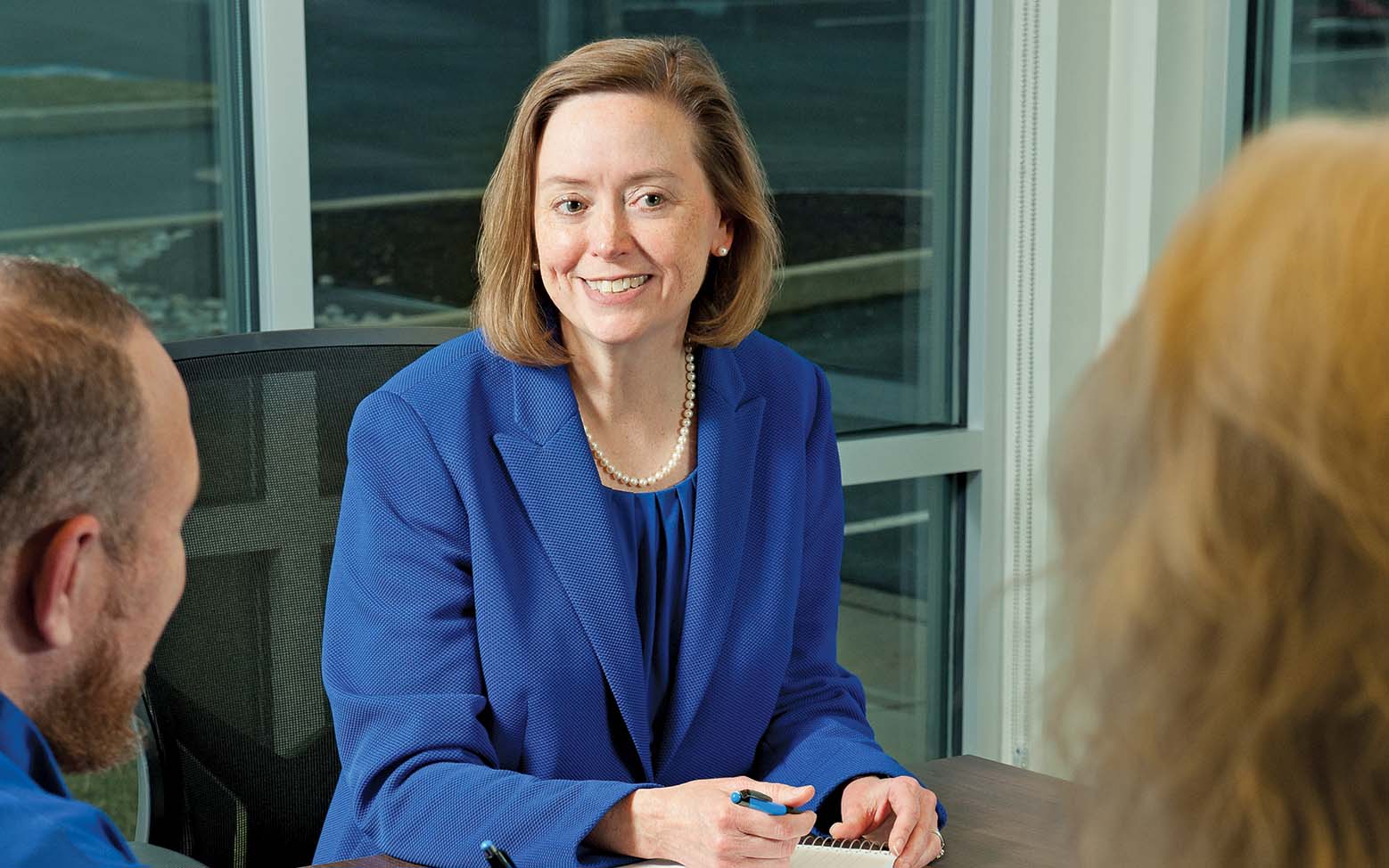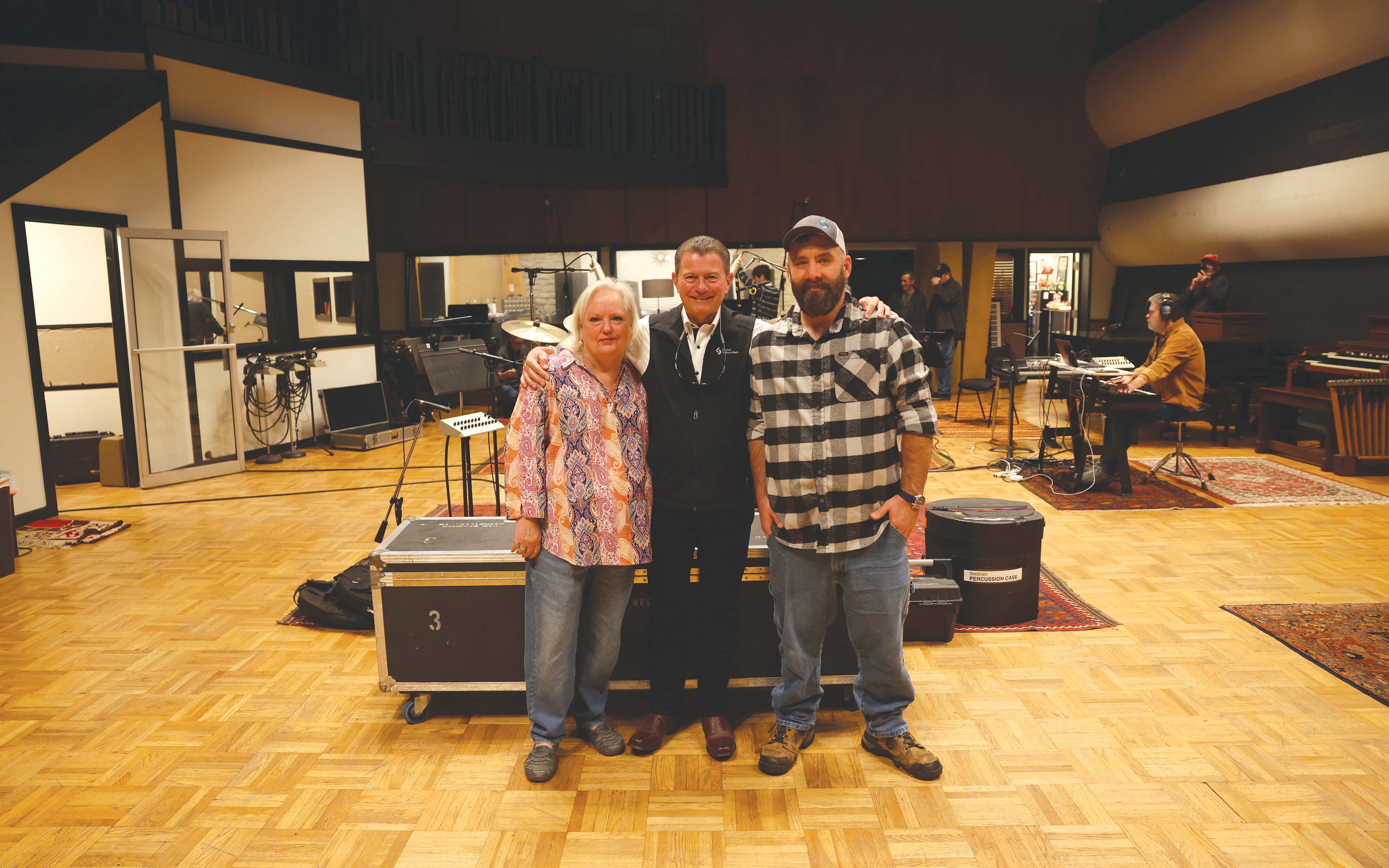What’s special about community banking is the support and growth young bankers see throughout their careers. These community bankers stuck with the industry, garnering knowledge and banking expertise that brought them from an ground-floor positions to their current executive roles.
Climbing the Community Bank Career Ladder
0725 Butler 2k
July 01, 2025 / By William Atkinson
What’s special about community banking is the support and growth young bankers see throughout their careers. These community bankers stuck with the industry, garnering knowledge and banking expertise that brought them from an ground-floor positions to their current executive roles.
A story in salesman and motivational speaker Zig Ziglar’s 1977 book See You at the Top goes like this: In the early 20th century, two men worked side by side driving spikes through rails and into railroad ties to build sections of railroads. They did so for countless workdays, until years later, one of the men had become president of the railroad.
One day, the president visited a new section of rail line being built and ran into his old coworker, who was still driving spikes. The two men spent over an hour catching up before parting ways with a warm handshake as the train pulled away.
Surprised by the interaction, the railroad crew gathered around their coworker, eager to learn why he was still on the tracks while his friend had risen to be president.
The man explained wistfully, “Twenty-three years ago, I went to work for $1.75 an hour. He went to work for the railroad.”
This story shows how, when it comes to building a career in any industry, what matters is not where you start but how you get there. In this article, five senior community bank executives who started in entry-level positions tell us how they worked their way to the top through ambition, hard work and a willingness to learn.
Kristen Butler
First Federal Bank & Trust
Kristen Butler, COO and senior vice president of $630 million-asset First Federal Bank & Trust in Sheridan, Wyoming, was introduced to community banking by a colleague.
Butler began her banking career in 1997 as a teller at a corporate bank. “I was recruited away from [that] corporate bank by a former coworker who knew me well,” says Butler. “He told me that my thought process and work ethic would be a better fit with the community bank.”
In 2008, Butler joined BlackRidgeBANK in Bismarck, North Dakota, as VP of client services, and continued working there after moving to Wyoming in 2015. She admits that there were challenges along the way. In 2019, when another community bank acquired BlackRidgeBANK, Butler made the decision to move to First Federal Bank & Trust in Wyoming.
“The biggest [challenge] was my own mind,” she says. “My ambition and hunger to climb the ladder were more aggressive than what others believed I was capable of. In their defense, maybe they did see potential, but the advancement opportunities just weren’t there at the time for me. I had to challenge myself to dig deep into my faith and let it guide me forward.”
Over the years, Butler had to remind herself why she chose community banking in the first place. She had to trust that in due time, her hard work would carry her through. She admits that there were many moments of self-doubt when she felt like giving up, switching banks or even changing careers altogether.
“But every time I tried to jump ship, I was reminded quickly that the grass isn’t always greener by who I like to call accountability partners,” she says. “Those are people in your life who hold you accountable to a process and don’t just tell you what you want to hear.”
Butler says her family was one of the most significant motivators in her success moving up the career ladder. Another was the need to embody strong behaviors: work ethic, pride, faith and the right mindset.
“A positive support system was crucial, and it extended beyond my family to include two community banks [BlackRidgeBANK and First Federal Bank & Trust] with leaders who shared a corporate mission that aligned with my own values and way of life,” she explains.
Butler recalls that the most rewarding and satisfying times in her career have been when current and former employees have told her that her work matters to them, that they appreciate what she does.
“Even more fulfilling is watching those same individuals rise through the ranks, knowing they once worked under my guidance or within my shadow,” she says.
Butler also appreciates that her efforts have earned enough respect to influence change, not just in systems or software, but in people. “That’s where the true impact lies,” she says.
Kevin M. Black
Heartland Bank

Kevin M. Black began his banking career in 1983 when he was just out of college. “There were very few jobs due to the ag crisis, but I wanted to be involved with ag financing,” he explains.
Black started as an ag lender and teller—his first job after graduating—at a community bank in eatern Iowa. After six months, he changed jobs to be closer to home and arrived at Heartland Bank in Gowrie, Iowa, doing telling, ag lending, backroom processing and daily general ledger balancing. With 42 years at the $250 million-asset bank under his belt, Black now serves as president and CEO.
Black believes that hard work, trying different things, hiring good people and then challenging them, and continually learning have served as the most significant reasons for his career success. And on that note, if you’re new to community banking, Black would recommend continuing to challenge yourself daily, educating yourself in new areas, building professional networks and surrounding yourself with people who are smarter than you.
Marsha Bumgardner
The Peoples Savings Bank

Marsha Bumgardner, president and CEO of $166 million-asset The Peoples Savings Bank in Urbana, Ohio, started her journey by pursuing an associate’s degree in accounting in 1993 and then working as a teller at a large commercial bank.
“However, I quickly realized that this environment wasn’t where I saw my future,” she says. “The bank was in the process of closing branches, and I didn’t feel my position was secure. I wasn’t willing to risk having to relocate.”

Around that time, a friend told Bumgardner about a community bank nearby, The Peoples Savings Bank, that was mutually owned by depositors of the bank. “Honestly, I wasn’t sure what to expect, but I was curious to explore the opportunity,” she says. She took her first position there as a teller.
Along the way, she has been a checking account coordinator, IT manager, compliance officer, treasurer, vice president of accounting, board secretary, corporate secretary, loan officer and executive vice president, before becoming president and CEO. And, of course, there were challenges in every role.
“One of the biggest challenges I’ve faced is the same challenge every banker encounters: the constantly evolving landscape of banking,” Bumgardner says. “Changing regulations and advancing technology create ongoing demands to stay compliant, maintain efficiency and offer customers the latest innovations.
“I have been able to expand my knowledge across the many different roles I’ve held,” she adds. “It has taken a great deal of determination, self-motivation and hard work to meet these challenges and continue growing in my career.”
Bumgardner believes her success is largely a result of her commitment to The Peoples Savings Bank. “I am a highly driven individual who consistently strives to do what’s best for the bank,” she says. “I’ve been fortunate to have the support of the board of directors and former presidents who provided me with opportunities to pursue my professional goals and further my education.”
The Peoples Savings Bank has supported her in earning her bachelor’s degree in accounting through its education reimbursement program.
“The bank has always fostered a culture of promoting from within,” Bumgardner says. “Through my involvement in many areas of the bank, serving as an officer and participating in financial discussions, I’ve gained a well-rounded and thorough understanding of our operations.”
Most importantly, Bumgardner has always believed that to be successful, leaders must be willing to do any task they ask of their coworkers, whether that means picking up trash in the parking lot or answering telephones.
“Leading by example has always been at the core of my leadership philosophy,” she says.
The importance of mentors
Executives’ success has a lot to do with their inherent abilities and work ethic. But virtually all of them also point to the mentors who helped them along the way.
“This isn’t a career where you can truly learn and grow on your own,” says Kristen Butler, COO and senior vice president for First Federal Bank & Trust in Sheridan, Wyoming. “I have always chosen to lean into mentors who carried the right mindset and perspective. Great leaders are always learning!”
Butler shares that one mentor, Stacy Gangl, took a chance on her when others wouldn’t. The corporate bank where the mentor worked as a district manager typically turned away anyone without a four-year degree. However, Gangl not only gave Butler an opportunity but encouraged her to step into management at a young age.
“Looking back, I believe she saw more in me than I saw in myself,” says Butler. The heart-to-heart conversations she had with Gangl—which she describes as “tough ones”—taught her what it really means to lead others. They weren’t easy conversations for Butler to have, but she is forever grateful. “Through [Gangl], I learned to embrace perspectives outside of my own and to hear what people say.”
Another mentor instrumental in Butler’s career was a man she worked with at her first position at BlackRidgeBANK, John Jessen, who believed in her so deeply that he became her voice at the leadership table. “He saw my potential and made sure others saw it, too,” she says.
When Jessen was able to “convince” other leaders of an idea or initiative that Butler had suggested, he never took the credit. “He always gave it to me,” Butler says. “Because of that, my name and my work began to carry more weight, and over time, I was leaned on more heavily for leadership and strategy.”
Marsha Bumgardner also gives a lot of credit to her advisors. “I have been fortunate to have many mentors who have guided me throughout my career,” says the president and CEO of The Peoples Savings Bank in Urbana, Ohio. “My predecessor, Brian Nicol, has always been a strong source of support. As I advanced within the company, Brian was both my biggest cheerleader and my toughest critic. I’ve learned that constructive criticism is one of the most valuable tools for growth and development.”
Whenever challenges or setbacks arose, Bumgardner said that Nicol was always there to help guide her through them, offering advice on how to improve and move forward.
“I’m grateful that he has continued to be a mentor even after his retirement,” she says. “Additionally, through some self-development seminars, I was fortunate to connect with a personal coach, LeeAnn Webster, who helps keep me grounded and continually encourages me to strive to be the best version of myself.”
Blake A. Feik
North Valley Bank

It’s perhaps not surprising that Blake A. Feik ended up as a community banker. “While in college, I had a knack for managerial accounting, which helped me immensely in analyzing business credit,” he says.
Feik began his community banking career as a teller before becoming mailroom manager and then proof department manager, being promoted to credit analyst and loan reviewer, teaching AIB/CFT commercial underwriting classes, becoming EVP and senior credit officer, specializing in commercial and real estate lending, and being named chief credit officer.
Now president and CEO of $250 million-asset North Valley Bank in Thornton, Colorado, Feik admits that his most formidable challenge was that he disliked loan workouts, because it seemed counter to his goal of helping borrowers. To address this, he came to realize that the completion of a workout was solving of a problem for both the bank and borrower. “In a way, this was a benefit to the borrower,” he says.
In terms of the keys to his success, Feik credits networking in the industry, success in business development, engaging persona with both customers and staff, and credit creativity.
His advice to those new to community banking? “Follow your manager’s lead, be dedicated and loyal to your employer and be willing to work through the early lean years,” he says.
Craig Buse
Springs Valley Bank & Trust Co.

Despite his current role as president and CEO of $624 million-asset Springs Valley Bank & Trust Co. in Jasper, Indiana, Craig Buse’s first position in community banking was as an information technology staff member.
In 2000, he was taking classes at a local tech school and framing houses part time. “I responded to an ad [for a job] in the local newspaper and ended up at Springs Valley Bank & Trust Co.,” he says.
Buse left the bank after graduation but returned in 2002. Over time, he worked as the network administrator and then began taking on roles as people left or as the bank needed areas brought up to speed. “That kicked in to a higher gear when our previous president, Jamie Shinabarger, took over after the great recession,” Buse says. “The bank had to make a lot of changes to be more competitive. [Shinabarger] gave me the opportunity to be in the middle of a lot of that change—IT tech, network administrator, operations manager, COO, CLO and then president and CEO.”

As Buse recalls, being young with less experience was a challenge. To overcome this, he listened, asked questions and made sure to learn from everyone that he could. “I embraced the folks in the organization and the industry who could help me learn,” he says. “I continue to learn from folks in our organization, community and industry.”
What has been the most significant reason for his success in moving up the ladder? Work ethic. “Putting in the work is the one thing I can control,” he says. “I won’t let anyone outwork me.”
Buse also had support from coworkers, supervisors, vendors and the employees who have reported to him. “My parents also gave me the tools and drove me to be a hard worker,” he says. “I had a lot of help learning the different aspects of banking. The most important thing I learned was the importance of core values and relationships.”
In terms of advice for those new to community banking, Buse recommends asking a lot of questions, building and cherishing relationships, and doing what is right.
Subscribe now
Sign up for the Independent Banker newsletter to receive twice-monthly emails about new issues and must-read content you might have missed.
Sponsored Content
Featured Webinars
Join ICBA Community
Interested in discussing this and other topics? Network with and learn from your peers with the app designed for community bankers.
Subscribe Today
Sign up for Independent Banker eNews to receive twice-monthly emails that alert you when a new issue drops and highlight must-read content you might have missed.
News Watch Today

Join the Conversation with ICBA Community
ICBA Community is an online platform led by community bankers to foster connections, collaborations, and discussions on industry news, best practices, and regulations, while promoting networking, mentorship, and member feedback to guide future initiatives.












